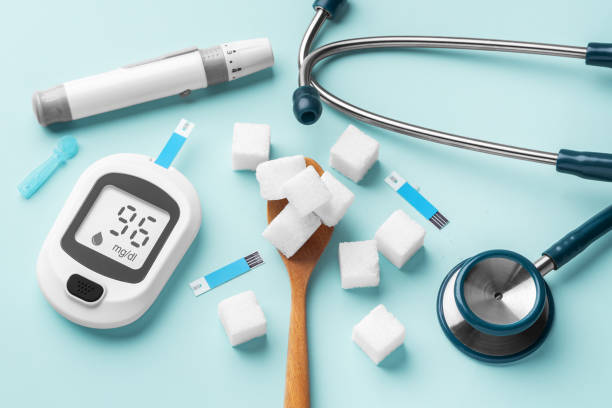Introduction: Understanding the Importance of Blood Sugar Control
Managing your blood sugar levels is an essential part of maintaining good health. When blood sugar is too high, a condition called hyperglycemia, it can lead to serious health problems such as diabetes, heart disease, and kidney damage. The good news is that making small, manageable changes to your daily routine can have a powerful impact on lowering your blood sugar levels. These simple adjustments not only help with blood sugar control but also improve your overall well-being.
In this blog post, we will share practical, easy-to-implement tips to help you keep your blood sugar in check and live a healthier lifestyle. These small, positive steps can make a big difference in your health over time.
1. Adopt a Healthy, Balanced Diet
One of the most effective ways to manage blood sugar is through a balanced, nutrient-rich diet. What you eat directly impacts your blood sugar levels.
Focus on Low-Glycemic Foods
Foods with a low glycemic index (GI) are absorbed more slowly, which helps keep blood sugar levels stable. Some excellent low-GI foods include:
- Whole grains (e.g., brown rice, quinoa)
- Non-starchy vegetables (e.g., spinach, broccoli)
- Legumes (e.g., lentils, chickpeas)
- Nuts and seeds
Include Fiber-Rich Foods
Fiber is an essential part of any diabetes-friendly diet because it slows the absorption of sugar. Try to include fiber-rich foods in your meals such as:
- Fruits like berries, apples, and pears
- Vegetables like carrots, broccoli, and sweet potatoes
- Whole grains like oats, barley, and bulgur
Limit Processed Foods and Sugars
Processed foods, sugary snacks, and refined carbohydrates can cause rapid spikes in blood sugar. Opt for natural, whole foods and reduce your intake of:
- Sugary drinks
- Packaged snacks
- White bread and pasta
Making mindful food choices will help you manage your blood sugar more effectively.

2. Exercise Regularly to Improve Insulin Sensitivity
Exercise plays a key role in managing blood sugar levels. It helps your body use insulin more effectively, which can help lower your blood sugar levels. Regular physical activity also improves your body’s overall ability to regulate blood sugar, supporting better long-term health.
Types of Exercise That Help
- Aerobic Exercise: Activities like walking, jogging, swimming, and cycling improve heart health while helping to lower blood sugar by increasing the body’s ability to use insulin.
- Strength Training: Lifting weights or doing bodyweight exercises (such as squats and lunges) helps to build muscle mass, which in turn enhances insulin sensitivity. The more muscle mass you have, the better your body can process blood sugar.
- HIIT (High-Intensity Interval Training): This type of exercise alternates between short bursts of intense activity and brief rest periods. HIIT has been shown to be highly effective in improving blood sugar regulation, even in a short amount of time.
Aim for at least 30 minutes of moderate exercise most days of the week. If you’re new to exercising, start slowly and gradually build up to longer or more intense workouts. Exercise is not only important for managing blood sugar but also for improving your overall health and energy levels.starting, try to incorporate small, manageable workouts and gradually increase intensity.
3. Maintain a Healthy Weight
Being overweight or obese can make it more difficult for your body to regulate blood sugar. Extra weight, especially around the abdomen, can reduce your body’s ability to use insulin properly. Losing even a small amount of weight can improve insulin sensitivity, lower blood sugar levels, and reduce your risk of developing type 2 diabetes.
Tips for Healthy Weight Management
- Eat Smaller Portions: Reducing portion sizes can help lower your overall calorie intake, making it easier to manage your weight and blood sugar levels.
- Stay Hydrated: Drinking plenty of water throughout the day helps your body process sugar more effectively, supporting better blood sugar control.
- Focus on Whole, Nutrient-Dense Foods: Choose nutrient-rich foods like fruits, vegetables, whole grains, and lean proteins. These foods will help keep you feeling full for longer, reducing the temptation to overeat and providing your body with the vitamins and minerals it needs.
Even a small weight loss—about 5-10% of your body weight—can have a big impact on your blood sugar control and overall health. By focusing on healthy habits, you can maintain a weight that supports your well-being and helps prevent diabetes.eight) can lead to significant improvements in blood sugar control.

4. Manage Stress Effectively
Chronic stress can raise blood sugar levels because stress hormones, like cortisol, trigger the liver to produce more glucose. This makes stress management a crucial part of controlling your blood sugar levels.
Effective Stress Management Techniques
- Practice Mindfulness: Activities like meditation, deep breathing exercises, and yoga are proven to reduce stress. These practices help your body relax, promoting better blood sugar control.
- Get Enough Sleep: Not getting enough rest can affect your blood sugar levels. Aim for 7-9 hours of quality sleep each night to allow your body to recharge and regulate blood sugar effectively.
- Engage in Relaxing Activities: Make time for hobbies or activities that help you unwind. Whether it’s reading, listening to music, or spending time with friends and family, taking breaks to relax is essential for managing stress.
Incorporating stress management techniques into your daily routine can help keep your blood sugar levels in check and enhance your overall well-being. Taking time to reduce stress not only supports better health but also improves your quality of life.
5. Stay Hydrated
Staying hydrated is vital for maintaining balanced blood sugar levels. When you’re dehydrated, your kidneys have to work harder to filter excess sugar from your bloodstream, which can lead to higher blood sugar levels and make it harder for your body to manage sugar properly.
Tips for Staying Hydrated
- Drink Water: Make it a goal to drink at least 8 glasses of water each day. Proper hydration supports your body in regulating blood sugar and helps it function at its best.
- Limit Sugary Drinks: Sugary beverages like sodas, fruit juices, and energy drinks can quickly spike blood sugar levels. Whenever possible, try to replace these with healthier, lower-sugar options.
- Herbal Teas: Unsweetened herbal teas are an excellent choice for hydration without adding extra sugar to your diet. They offer a refreshing and flavorful alternative to sugary drinks and can help keep you hydrated throughout the day.
By staying well-hydrated, you assist your body in processing sugar more efficiently, reducing the likelihood of blood sugar spikes and supporting your overall health. Proper hydration is a simple but powerful way to help manage your blood sugar and improve your quality of life.
6. Get Regular Check-Ups
Regular health check-ups are essential for keeping track of your blood sugar levels, particularly if you’re at a higher risk for diabetes. Routine tests, such as the A1C test, help you monitor your blood sugar over time and detect potential issues early, before they turn into serious health problems.
Work With Your Healthcare Provider
Collaborating with your healthcare provider is vital for managing your blood sugar effectively. Together, you can create a personalized plan that suits your unique health needs. Your doctor may recommend specific lifestyle changes, medications, or supplements to help keep your blood sugar levels within a healthy range.
Regular check-ups also help you catch any complications early, making it easier to address problems before they become more serious. By staying proactive and maintaining open communication with your healthcare team, you can take control of your blood sugar levels and support your long-term health.

7. Limit Alcohol and Avoid Smoking
Both smoking and drinking too much alcohol can negatively affect your ability to regulate blood sugar.
Why You Should Limit Alcohol and Quit Smoking
- Alcohol: Drinking large amounts of alcohol can interfere with your blood sugar control and insulin sensitivity. This can make it harder for your body to keep blood sugar levels in a healthy range. If you choose to drink, it’s important to do so in moderation to prevent any negative effects on your health.
- Smoking: Smoking increases insulin resistance, which means your body struggles more to manage blood sugar levels. Quitting smoking is one of the most important lifestyle changes you can make to improve both your blood sugar control and your overall health.
By limiting alcohol intake and quitting smoking, you can better protect your blood sugar levels and improve your health in the long run. These changes are powerful steps toward maintaining a healthier lifestyle.
Conclusion: Take Control of Your Blood Sugar Today
Making small, consistent changes to your daily habits can have a major impact on your blood sugar levels. By adopting a balanced diet, staying active, managing stress, staying hydrated, and making other healthy lifestyle choices, you can reduce the risk of blood sugar imbalances and improve your overall health.
It’s never too late to begin making these positive changes. Start by focusing on one or two changes, then gradually build on them over time. Your health is in your hands, and you have the power to take control of it!
Are you ready to take charge of your blood sugar levels? Begin incorporating these healthy habits into your daily life today. Feel free to share your journey with us in the comments below or reach out to your healthcare provider for additional guidance on managing your blood sugar effectively.

